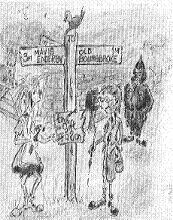One of my pastimes is solving The Times crossword. Most days I do it in concert with my friend, Ken, and there is a fair bit of friendly rivalry involved. He's better than I at the lateral thinking element of the process, while I, as he would say adopt a more analytical, indeed anal, approach.
To be a successful cruciverbalist you need a decent general knowledge and a wide vocabulary. More than that you need to take an interest in how words are formed, their origins and variations. To ask the question, for example, is there any connection between 'anal' and 'analytical'? Probably not. It's an example of what my old Latin master, Joe Gledhill, use to call 'Macedon and Monmouth' - now did he make that up or does it come from somewhere. You see, already two things to look up.
Yesterday, someone asked, 'Why do we say ''in the offing''?' I wondered. Something to do with 'offering' or 'on offer'? Apparently not. It's a nautical term, referring to that part of the sea that is most distant from the land while remaining visible. Thus a ship approaching harbour might be said to be in the offing.
The other day I heard a radio programme called Back to Square One. Why was it called that when it was about the history of football commentating? According to the contributors it's because when the football matches were first broadcast on radio, listeners were assisted by means of squared charts published in The Radio Times. Thus, if a ball was passed back to the goalkeeper, it was sent back to square one.
Others say it is merely a reference to board games like Snakes and Ladders, which seems more likely to me.
I wonder if this phrase is one of those that the Oxford Dictionary is asking the public to help it research. Apparently there are only very recent datable occurrences of phrases like 'Jack the Lad', 'Bloody Mary' and 'Codswallop'.
Often people like to give knowledgeable-sounding but totally false explanations of how words and phrases arose. For example, I was told once that Massachusetts got its name when the first governor, wondering what to call his new jurisdiction, asked his black slave if he had any ideas. 'No,' said the man. 'Massa chuse it.' That wasn't supposed to be a joke, either.
Another one was the claim that New Zealand is nicknamed the Land of the Long White Cloud because of the masses of sheep that can be seen from the air.
If you take the tour bus of historic Lincoln during the summer you will be shown where public hangings used to take place in the Castle. You will be told the the practice led to two expressions in general circulation today: 'Hangers-on' and 'Money for old rope.'
'Hangers-on' is supposed to relate to the relatives of the condemned man or woman who would often be left to dangle and choke. The relatives would hang on to his legs to speed up his death and end his suffering. Who knows, but it's more colourful than the obvious explanation that it means a simple parasite or leech.
'Money for old rope'. Ghoulish onlookers at these executions would be willing to buy pieces of the rope as a souvenir. The executioner would cut it up into as many pieces as possible to maximise his profit. Hence the expression. Others say it merely meant being paid for inferior rope of any kind, rope once being used for far more purposes than it is today. In other words, the same sort of thing as ' a pig in a poke'.
At least the tour guide doesn't say that the phrase 'left hanging around' originated at these events.
And by the way, I want no more Saddam jokes.

No comments:
Post a Comment